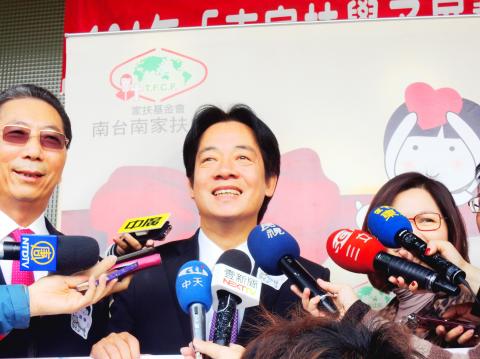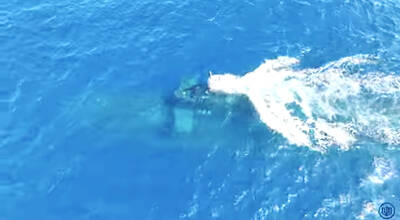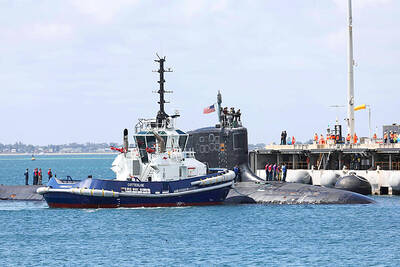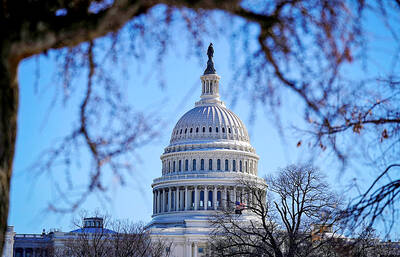Despite speculation and encouragement from supporters, Tainan Mayor William Lai (賴清德) yesterday announced that he would not run in next year’s presidential election, adding that he would fully support Democratic Progressive Party (DPP) Chairperson Tsai Ing-wen’s (蔡英文) campaign.
“I will not join the DPP primary for next year’s presidential candidate,” Lai told reporters at a charity event in Tainan. “First of all, I think it’s more important to hold on to values than hold any positions, and I don’t necessarily have to be the person who leads the party to victory.”
Lai added that Tsai has been preparing to run in next year’s election for a long time and is a good candidate to represent the DPP, “since she has led the DPP to stand up again after its defeat in 2008 and it was under her leadership that the DPP was able to win in the nine-in-one local elections last year.”

Photo: Tsai Wen-chu, Taipei Times
“The DPP should stand united and give its full support to Tsai — and I will also give my best wishes to her,” Lai said.
He said that he did not want to quit his current position now, as he has a rare chance to reform local politics in Tainan, adding that “it is more important to uphold a value than hold a position.”
Although Lai said he would not take part in next year’s presidential election and the DPP finalized its nomination schedule last month, many supporters as well as DPP politicians — including former presidential adviser Koo Kwang-ming (辜寬敏) and Kaohsiung Mayor Chen Chu (陳菊) — have expressed their support for Lai, with Koo even promising the media that Lai would decide to run in the end.
However, Lai declined to answer when asked if he decided not to run because his support rate is much lower than Tsai’s.
Meanwhile, Tsai said she respects Lai’s decision and lauded him as a courageous and talented politician.
“Lai is an excellent political leader in the party; what he has accomplished as mayor of Tainan makes him a role model in leadership and governance,” Tsai said. “I especially admire him for his courage in fighting against dirty money and reforming local politics.”
“As Lai is an excellent politician, I would like to invite him to be part of the 2016 presidential election [campaign],” she added.

CSBC Corp, Taiwan (台灣國際造船) yesterday released the first video documenting the submerged sea trials of Taiwan’s indigenous defense submarine prototype, the Hai Kun (海鯤), or Narwhal, showing underwater navigation and the launch of countermeasures. The footage shows the vessel’s first dive, steering and control system tests, and the raising and lowering of the periscope and antenna masts. It offered a rare look at the progress in the submarine’s sea acceptance tests. The Hai Kun carried out its first shallow-water diving trial late last month and has since completed four submerged tests, CSBC said. The newly released video compiles images recorded from Jan. 29 to

DETERRENCE EFFORTS: Washington and partners hope demonstrations of force would convince Beijing that military action against Taiwan would carry high costs The US is considering using HMAS Stirling in Western Australia as a forward base to strengthen its naval posture in a potential conflict with China, particularly over Taiwan, the Wall Street Journal reported on Saturday. As part of its Indo-Pacific strategy, Washington plans to deploy up to four nuclear-powered submarines at Stirling starting in 2027, providing a base near potential hot spots such as Taiwan and the South China Sea. The move also aims to enhance military integration with Pacific allies under the Australia-UK-US trilateral security partnership, the report said. Currently, US submarines operate from Guam, but the island could

RESTRAINTS: Should China’s actions pose any threat to Taiwan’s security, economic or social systems, China would be excluded from major financial institutions, the bill says The US House of Representatives on Monday passed the PROTECT Taiwan Act, which states that Washington would exclude China from participating in major global financial organizations if its actions directly threaten Taiwan’s security. The bill, proposed by Republican Representative Frank Lucas, passed with 395 votes in favor and two against. It stipulates that if China’s actions pose any threat to Taiwan’s security, economic or social systems, the US would, “to the maximum extent practicable,” exclude Beijing from international financial institutions, including the G20, the Bank for International Settlements and the Financial Stability Board. The bill makes it clear that China must be prepared

Taiwanese trade negotiators told Washington that Taipei would not relocate 40 percent of its semiconductor production to the US, and that its most advanced technologies would remain in the nation, Vice Premier Cheng Li-chiun (鄭麗君) said on Sunday. “I told the US side very clearly — that’s impossible,” Cheng, who led the negotiation team, said in an interview that aired on Sunday night on Chinese Television System. Cheng was referring to remarks last month by US Secretary of Commerce Howard Lutnick, in which he said his goal was to bring 40 percent of Taiwan’s chip supply chain to the US Taiwan’s almost